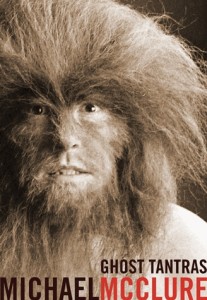Ghost Tantras by Michael McClure
 Ghost Tantras
Ghost Tantras
by Michael McClure
City Lights, Forthcoming November 2013
106 pages / $13.95 Preorder from Amazon or City Lights
Michael McClure’s classic Ghost Tantras (long out of print but soon to be re-released by City Lights) was self-published in 1964 and in 2013 it continues to be just as strange, earnest, ridiculous, and fascinating a work. Somehow, Ghost Tantras reads today both as fresh and faded. There’s something about McClure’s “beast language,” intended to put readers in touch with their primordial, animal selves, that sounds simultaneously urgent and dated. McClure’s poetic passion and undeniable force is immediate and magnetic. Thematically, however, McClure’s “beast language” appears unaware of its own contradictions. Whether or not you agree with McClure’s linguistic philosophy, you simply cannot ignore a poem like “Tantra 32:”
dorr kann bee blayke leet eer noo tow thownie
dann brekk thay mah torr blurt noh breshk bakk
mag me toww noh oww thoonie meeee blest !
KHRAHRR ! SHELF ! TEEMOWW !
eem now oodorr sen bless I thee ooh-nohh
carnal air of wax portrayed in smoke.
THEE OWW OHH MY
sung & sad fabled sleeping self
grahoored to waking gowwr.
These poems are intense, serious, hilarious, beautiful. The “beast language” is intended to appeal to the animal inside every human (animals can’t read, unfortunately, even in beast language, which is perhaps why McClure famously read his poems aloud to lions at the San Francisco Zoo. For McClure, language is something entirely different than simple words and syntax. He pushes language to many limits, most of them definitive. Words here become sounds, writing becomes speech; what is so foundationally cultural—language—is imagined and acted upon as natural. If nothing else, this makes for some bravely original and compelling poetry, and McClure is widely recognized today as a revolutionary poet because of his atypical attitudes toward language.
There is a beautiful energy around Ghost Tantras, and around McClure’s mystique, but looking at the 1960s from our vantage point, it’s hard to believe McClure actually thought these poems would “change the shape of the universe.” It is perhaps a testament to the importance of poetry (and cultural life in general) in America in the 1960s that anyone would believe such a thing. Maybe we need some of that confidence today. Hesitancy, academization, and critical thinking have certainly brought poetry, and the universe, nowhere fast. McClure and his generation are undoubtedly courageous writers, even if they appear to us as naïve. Naïvete may be a necessary foundational element for work as bold as this. McClure’s attempts to construct a natural language fail because he uses the English alphabet to construct that language (not to mention that beast language sounds conspicuously like Old English). The natural, or a direct biological reality, cannot be divorced from our intellectual understanding of that reality. McClure is attempting to construct something pure and natural from the cultural debris he happens to pick up. Unfortunately, he doesn’t interrogate his choices of debris. Nevertheless, the philosophical shortcomings of Ghost Tantras are central to its success. In her book Stupidity, Avital Ronell writes,
The severest of poets ventured, as if prompted by some transcendental obligation, into a consecrated domain where language meets its unmasking in stupidity, idiocy, imbecility, and other cognates of nonknowing. [. . .] Poetic language remains sheer promise and, in the way shown by Hölderlin, capable of hearing the alien unsaid.
McClure is the severest of poets, an American Hölderlin, and Ghost Tantras shows us the unexpectedly beautiful things that poetry can do when it is pressed against and beyond its rational limits. Beast language is a cognate of nonknowing, though it remains sheer promise. Ultimately, Ghost Tantras stands as a historical marker of the radical courage and passion of McClure and his generation, and it is perhaps time for that message to be heard, without understanding, once again.
***
Housten Donham is a poet and critic. He lives in the SF Bay Area. He sometimes updates his tumblr (elkrunningfromwolves.tumblr.com).
September 16th, 2013 / 11:00 am
